- Home
- Steven Brust
The Phoenix Guards Page 29
The Phoenix Guards Read online
Page 29
“So much the worse.”
“But it is true that I am worrying less than I did a few minutes ago.”
“That is well. Then let us enjoy the ride, the day, and the lovely view of the mountains that we will, I think, be granted in only a few minutes, when this path takes us around the boulder that lies just ahead.”
When it came time to rest for the day, Uttrik wondered aloud about the path they had chosen, and in this he was seconded by Kathana. Aerich, however, coolly explained that they were on a mission entrusted them by their Captain, and that, as they were taking the route to their destination, Uttrik and Kathana would simply have to postpone murdering one another for a few days yet. Neither was happy at this; however, once they saw that the four Guardsmen were determined on this route, they were forced to accept it.
That night they rested high in the mountains, close around a large fire built of wood that was slightly damp and kindled with a great many pine-needles, and all of them awoke with the feeling of vigor that only a night in the mountains can bring. They broke their fast with bread and goat’s cheese that Lord Adron had thoughtfully supplied for their journey, and passed a peaceful day which brought them down into the valley between Bli’aard and Kieron, with the immensity of the Ironwall, that great vertical slab of brown rock that might have been created by the gods in a vain attempt to keep Easterners and Dragaerans apart, looming ever above them to the east.
This attempt, we may say, might have been successful were it not for the Eastern River, which, over the course of eons, had dug for itself a passage in Mount Kieron, until it came to a green fertile plateau which was equally accessible from the east or the west, and was, over the thousands of miles that the Eastern Mountains stretch, one of only three or four places that gave any sort of easy access between the two civilizations, if we may be permitted to use this word to describe the way the Easterners live.
That evening, as they prepared to sleep in the comparative warmth of the valley that they would, on the morrow, begin climbing up from with the same energy they had just spent climbing down to, Kathana took the opportunity to take out her sketch pad and crayon and make some drawings of the Ironwall, while Uttrik studied the dark, empty sky as if to read omens there as the ancients were said to. Aerich sat by the fire with his crochet hook, Pel sat with pen and paper composing a letter to someone whose name he did not care to divulge, Khaavren brooded, and Tazendra slept.
The last light of day was following the Eastern River out of the valley when Kathana suddenly said, “Hullo, what is this?”
Khaavren, who was taking less pleasure in his activity than any of the others were taking in theirs, and was thus more easily broken from it, said, “What have you found, Kathana?”
“I have found nothing, Khaavren. But I have seen something.”
“Well,” said Pel, looking up from his letter with some annoyance, “what have you seen?”
“As to that,” said Kathana, “I am not entirely certain, yet it seemed to me that something moved in those rocks.”
“Well?” said Khaavren. “There is no shortage of fauna in the mountains. There are, first of all, norska—”
“Well, it was larger than a norska.”
“Then there are dragons.”
“It was smaller than a dragon.”
“There are dzur and tiassa.”
“These do not walk on two feet.”
“Well, there are darr.”
“Not in these mountains.”
“There are bear in these mountains.”
“Bear do not wear hats.”
“What? It was wearing a hat?”
“I am all but certain of it.”
“Then perhaps it was a man.”
“That is my conclusion,” said Kathana. “And a man, moreover, who wishes to remain concealed, if we are to judge by the fact that I only caught a glimpse of him ducking behind the rocks, and that, since then, there has been no—ah, there he is again.”
“Well, yes, I did see something,” admitted Khaavren. “Brigands, do you think?”
“Brigands,” said Kathana, who had unusually sharp eyes, “do do not wear the red and silver.”
“The Light!” said Pel. “A Tsalmoth!”
“Well,” said Uttrik, “what would a Tsalmoth be doing here?”
Tazendra opened an eye and said, “Watching us, I would think.”
“That,” said Aerich, “is not unlikely.”
“Yet I wonder who it might be,” said Kathana.
“Oh, as to that,” said Pel, “I have a theory.”
“Well? And that is?”
“Lord Garland.”
“Garland!” said Khaavren. “The favorite?”
“The messenger,” said Pel.
“That is true; we know him to be nearby. But, what might he be doing?”
“Spying on us,” said Pel.
“For what purpose?”
“In order to attack us.”
“How, attack us?” said Kathana.
“We have been attacked several times since we left home, ’tis true,” said Tazendra.
“For what reason?” said Kathana.
“Oh, as to that,” said Khaavren. “I assure you we are entirely ignorant.”
“And is it Lord Garland who has been directing these attacks?”
“Well, that is possible,” said Pel.
“Let us ask him,” said Kathana.
“We must find him first,” said Uttrik.
“That is difficult,” said Pel. “For, you perceive, it is already dark, and soon we will not be able to see anything beyond the range of our small fire.”
“Not at all,” said Tazendra. “Have you forgotten that I am a sorcerer?”
“Then,” said Kathana, “you can light up the area where he is hiding?”
“It is not unlikely,” said Tazendra.
“It would be a good idea to have light,” said Kathana.
“Well,” said Tazendra, who stood and drew her sword, “let us be about it.”
“But what,” said Pel, “will we do once we have light? They are doubtless preparing to massacre us, and I don’t think we shall be as lucky this time as we were before.”
“Oh,” said Tazendra, “Khaavren will think of something.”
“I assure you,” said Khaavren, “that I have entirely exhausted my store of ideas.”
“Well then,” said Aerich carelessly, “someone else will. Come, make the light.”
“And yet,” said Khaavren, “they may have an entire army ready to attack us, and I, for one, am loathe to begin a fight against an army until we have managed to equip ourselves with one as well.”
“Do you know,” said Tazendra, “that gives me an idea.”
“I am not startled,” said Aerich. “I have always believed that you do yourself too little credit in the matter of ideas, merely because you are slower than some in the matter of comprehension.”
“So you think,” said Tazendra, “that ideas and comprehension are not co-related?”
“Where did you learn that word, Tazendra?” said Pel.
“I have no idea,” said Tazendra.
“And yet,” said Uttrik, “I had thought you just said you had an idea.”
“Come,” said Kathana. “Let us hear this famous idea before we are attacked and it becomes, like our souls, immaterial.”
“But,” persisted Uttrik, “she said she had no idea.”
“Well, this is it, then,” said Tazendra, ignoring Uttrik. “But first, who has a loud voice?”
“I have,” said Kathana.
“Very well, then here it is.” And she quickly sketched out a plan which, after a few additions by Uttrik and Kathana, was agreed upon.
“Make the light then,” said Kathana.
“Very well,” said Tazendra.
And while it would be possible for us to simply relate all that followed the casting of this simplest of spells, we must admit that we would find it more amusing to delay this revel
ation; or rather, to find an indirect method of describing it. While the amusement of the historian may be insufficient reason to take such a circuitous route to relation of facts, rest assured we have another reason as well, that being the necessity of describing another conversation in which these very events are announced.
It would seem, therefore, that if we were to allow our readers, by virtue of being in the company of the historian, to eavesdrop on this interchange, we will have, in one scene, discharged two obligations; a sacrifice, if we may say so, to the god Brevity, whom all historians, indeed, all who work with the written word, ought to worship. We cannot say too little on this subject.
This having been stated, then, we will carry our worship of the aforementioned god so far as to dwell no longer on explanations, but instead will at once bear our readers to a place some two leagues back toward Redface and an hour in the future, where Lord Garland (Pel was correct concerning the identity of the Tsalmoth) is staring hard at the gold disk that we watched him receive from Seodra.
After a few minutes, it seemed to him that he heard her voice, as if in his very ear, saying, “Is that you, Garland?”
“It is, your ladyship.”
“Well? Have you something to report?”
“I do, your ladyship.”
“Have you, then, completed your task?”
“Not yet, your ladyship.”
“How, not? Were my instructions not explicit enough?”
“Oh, no, your ladyship. There was no flaw in the instructions, except—”
“Well?”
“Except, we were betrayed, your ladyship.”
“Betrayed? Impossible!”
“It is true.”
“By whom?”
“I can only think by the dweller in the house with stones like crooked teeth, your ladyship.”
“The notion is absurd. Confess, Garland, that you bungled the mission.”
“Your ladyship, that may be. Yet, had we not been betrayed—”
“You use that word again, Garland.”
“Well, and is it not a perfectly good word, your ladyship?”
“Oh, I have no quarrel with the word.”
“And then?”
“But its application in this case.”
“I must hold to it, your ladyship.”
“And yet I declare that the thing is impossible.”
“Well, I will relate what happened to you, and you may then judge for yourself.”
“And at once, I hope.”
“Without delay.”
“Begin then.”
“Well, your ladyship, your instructions after the failure of the attack outside The Painted Sign—”
“Which failure I still do not understand, Garland.”
“No more do I, your ladyship.”
“Very well, continue. After the attack—”
“Yes, your ladyship. After the attack, I was to return the seal to Lord Adron.”
“And did you do so?”
“I did.”
“And did he invite you to remain?”
“Yes, your ladyship, just as you said he would.”
“And did you do so?”
“No, your ladyship, since your orders were to plead that I was in a hurry to return to His Majesty, I did so, and excused myself.”
“Very well. And did you give him His Majesty’s letter?”
“No, I still hold it, as your ladyship instructed.”
“Very well. And then?”
“And then, I was to travel to a small hamlet below Redface, which is called FourCrossings, and there I was to locate a certain unmarked house, identified by three large stones set in front of it, pointing up and outward like crooked teeth.”
“You have an excellent memory, Garland.”
“I have come to rely upon it, your ladyship.”
“Well, and did you find the house?”
“Exactly as you said.”
“And did you speak to him who was within?”
“I did more than speak to him. As instructed, I showed him this very disk which is now allowing me to communicate with your ladyship.”
“Very well. And he?”
“He put himself entirely at my, that is to say, your service.”
“Well, and what did you do then?”
“I instructed him to deliver to me a flash-stone of sufficient strength to destroy nine men.”
“How, nine? They were only five and a lackey.”
“And yet, your ladyship, it seemed wise to prepare for surprises.”
“Well, I accept that. Go on. Did he deliver the stone?”
“Within minutes, your ladyship. He seemed to have had one ready.”
“So, and you?”
“I then asked him to gather sixty warriors he could trust, and, with himself, to accompany me, and to use both the flash-stone and the warriors against those I indicated.”
“Well, and he?”
“He only asked leave to call his comrades and to gather supplies for the journey.”
“Did he ask any questions?”
“He asked how long we would be away, so he might know what to bring.”
“And you told him?”
“That I didn’t know.”
“And he?”
“He did not seem disturbed, but instantly gathered his troop together, after which we set off.”
“Well, and how much time was involved in this gathering?”
“Scarcely three hours, your ladyship.”
“Well, and then?”
“Then we set off, your ladyship.”
“And what were the results of the journey?”
“The very next morning, your ladyship, as we were positioned in a spot overlooking Castle Redface, we saw the six of them leave.”
“Six. You mean, five plus the lackey.”
“I beg your pardon, your ladyship. There were six plus the lackey.”
“How, six?”
“I counted them several times to see if I was mistaken.”
“Well, and?”
“And there were six of them, as well as the lackey.”
“But, who was the sixth?”
“The sixth was the Baroness Kaluma, that is, Kathana e’Marish’Chala.”
“What? She traveled with them?”
“It is as I have had the honor to inform your ladyship.”
“But then, you knew not to kill her, I hope.”
“I had no sooner observed her presence, then I informed my battalion, if I may use such a word, that she was under no circumstances to be killed.”
“That is not so bad, then.”
“Well, I have the honor to inform your ladyship that it didn’t matter.”
“How, it didn’t matter?”
“No, because we were unable to touch them.”
“What, they were protected?”
“In a most formidable way, your ladyship.”
“In what way was that, Garland.”
“They had an army.”
“How, an army?”
“A brigade at least, preparing an ambuscade for us.”
“And were you caught in it?”
“No, we were able to escape with little injury.”
“But, how did it come about?”
“Well, we were taking a position around their camp, which was near the Floating Bridge.”
“Yes, I know the area. What were your positions?”
“Your ladyship, we had surrounded them.”
“Well, and what time was it?”
“Dusk was falling.”
“A good time for an attack, I think.”
“So I thought, your ladyship.”
“Well, and then?”
“It was at that moment, your ladyship, just as we were about to discharge the flash-stone and commence the attack—”
“A heavy flash-stone and a troop of sixty, you say.”
“Yes, exactly. At that moment, the sky was lit up, and we were, instead of being
hidden, terribly illuminated.”
“Bah. The simplest of sorceries. Was that all?”
“Not in the least.”
“What else, then?”
“At that moment, we were attacked by their brigade.”
“You were attacked you say?”
“Yes. At least, the order was given.”
“By whom?”
“I believe that I recognized the voice of the Baroness of Kaluma giving the orders.”
“Well, what were these famous orders?”
“She was deploying her forces for a counter-attack.”
“In what manner?”
“Well, first she cried to her lancers to be at the ready.”
“Lancers?”
“Yes, your ladyship.”
“Well, what else?”
“She required her archers to remain in position.”
“Archers? Are you certain?”
“She spoke in a loud voice, your ladyship, so that her brigade could hear her, as a consequence of which, we could, also.”
“What then?”
“Then she commanded her cavalry to prepare to charge.”
“Is that all?”
“No, for she also ordered her sorcerers to prepare counterspells, in case any were needed, and to lead the attack as well, from which I deduced there were a good number of them.”
“Sorcerers!”
“That is it, your ladyship.”
“Well, and did the cavalry charge?”
“I must assume it did, your ladyship. At any rate, the sorcerers attacked.”
“Sorcerers?”
“Well, there were loud noises and bright flashes of light, such that I can see no other way than sorcery to achieve the explosions that must have caused them.”
“But you did not see the arrows, or the lancers, or the cavalry?”
“Your ladyship, it seemed that we were caught in an ambuscade, and, to avoid a massacre, I ordered that we retreat at once.”
“Well, and did your troop obey?”
“They more than obeyed, most of them were gone before I gave the command.”
“I see.”
“But, as we were attempting to leave, some of our brigade must have stumbled across the enemy forces, for three did not return.”
“Three, you say.”
“So, your ladyship, we must have been betrayed.”
“You are right, Garland, you were betrayed.”
“I am glad your ladyship understands.”
“I more than understand, I can tell you who betrayed you.”

 Phoenix
Phoenix Tiassa
Tiassa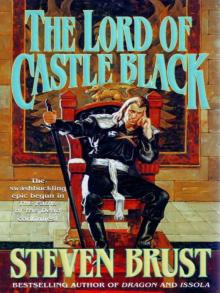 The Lord of Castle Black
The Lord of Castle Black To Reign in Hell: A Novel
To Reign in Hell: A Novel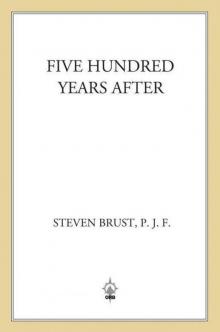 Five Hundred Years After (Phoenix Guards)
Five Hundred Years After (Phoenix Guards)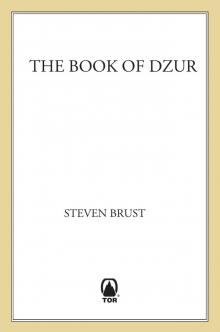 The Book of Dzur: Dzur ; Jhegaala
The Book of Dzur: Dzur ; Jhegaala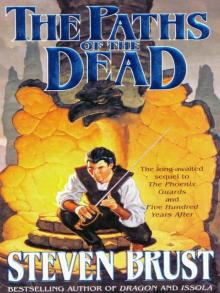 The Paths of the Dead
The Paths of the Dead Jhegaala
Jhegaala The Desecrator: A Tor.com Original
The Desecrator: A Tor.com Original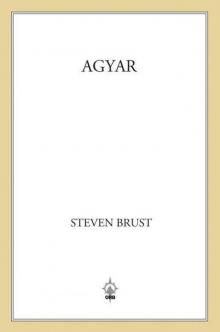 Agyar
Agyar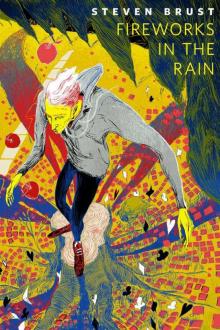 Fireworks in the Rain
Fireworks in the Rain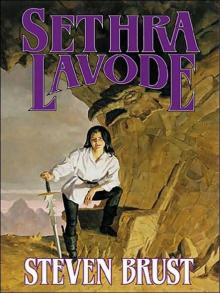 Sethra Lavode
Sethra Lavode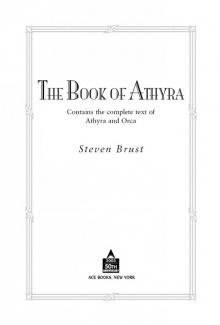 The Book of Athyra
The Book of Athyra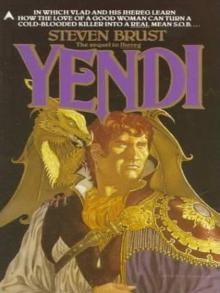 Yendi
Yendi Good Guys
Good Guys The Book of Jhereg
The Book of Jhereg Cowboy Feng's Space Bar and Grille
Cowboy Feng's Space Bar and Grille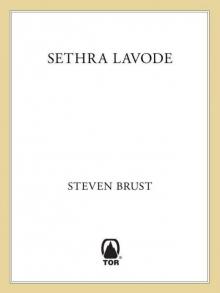 Sethra Lavode (Viscount of Adrilankha)
Sethra Lavode (Viscount of Adrilankha) My Own Kind of Freedom
My Own Kind of Freedom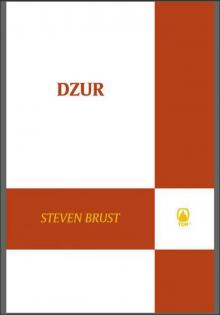 Dzur (Vlad Taltos)
Dzur (Vlad Taltos) The Lord of Castle Black: Book Two of the Viscount of Adrilankha
The Lord of Castle Black: Book Two of the Viscount of Adrilankha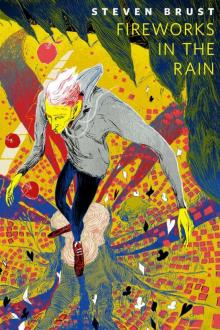 Fireworks in the Rain: A Tor.Com Original
Fireworks in the Rain: A Tor.Com Original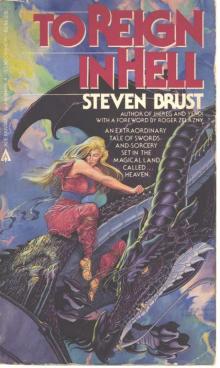 To Reign In Hell
To Reign In Hell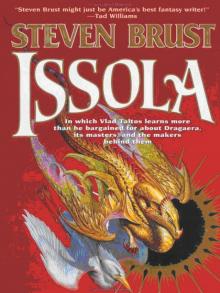 Issola
Issola Orca
Orca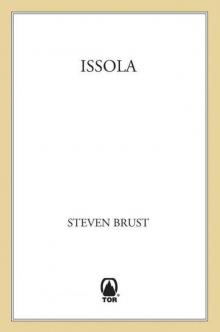 Issola (Vlad Taltos)
Issola (Vlad Taltos)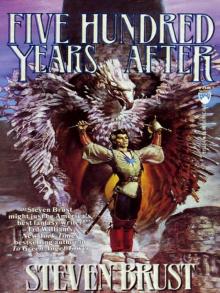 Five Hundred Years After
Five Hundred Years After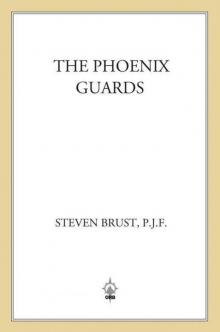 The Phoenix Guards
The Phoenix Guards Taltos
Taltos![[Vlad Taltos 06] Athyra Read online](http://i1.bookreadfree.com/i1/03/24/[vlad_taltos_06]_athyra_preview.jpg) [Vlad Taltos 06] Athyra
[Vlad Taltos 06] Athyra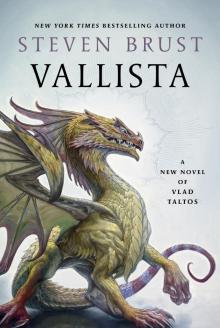 Vallista--A Novel of Vlad Taltos
Vallista--A Novel of Vlad Taltos The Incrementalists
The Incrementalists![[Vlad Taltos 04] Taltos Read online](http://i1.bookreadfree.com/i/03/24/[vlad_taltos_04]_taltos_preview.jpg) [Vlad Taltos 04] Taltos
[Vlad Taltos 04] Taltos![[Vlad Taltos 03] Teckla (v 1.1) Read online](http://i1.bookreadfree.com/i1/03/27/[vlad_taltos_03]_teckla_v_1_1_preview.jpg) [Vlad Taltos 03] Teckla (v 1.1)
[Vlad Taltos 03] Teckla (v 1.1) The Book of Taltos
The Book of Taltos The Paths of the Dead (Viscount of Adrilankha)
The Paths of the Dead (Viscount of Adrilankha) Jhegaala (Vlad Taltos)
Jhegaala (Vlad Taltos)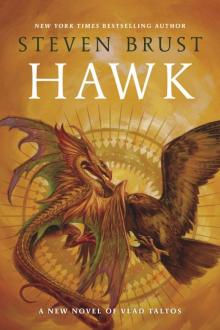 Hawk (Vlad)
Hawk (Vlad)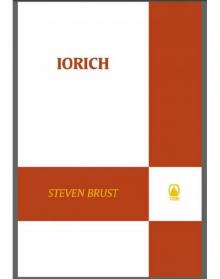 Iorich
Iorich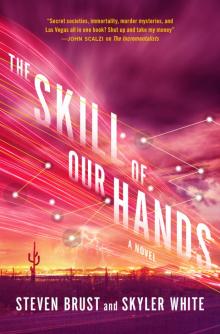 The Skill of Our Hands--A Novel
The Skill of Our Hands--A Novel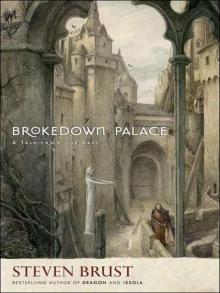 Brokedown Palace
Brokedown Palace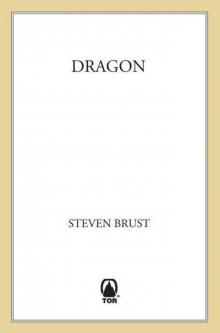 Dragon (Vlad Taltos)
Dragon (Vlad Taltos) Dragon
Dragon Athyra
Athyra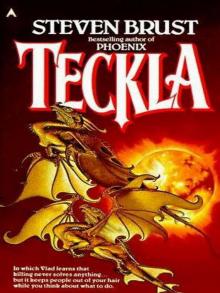 Teckla
Teckla Dzur
Dzur